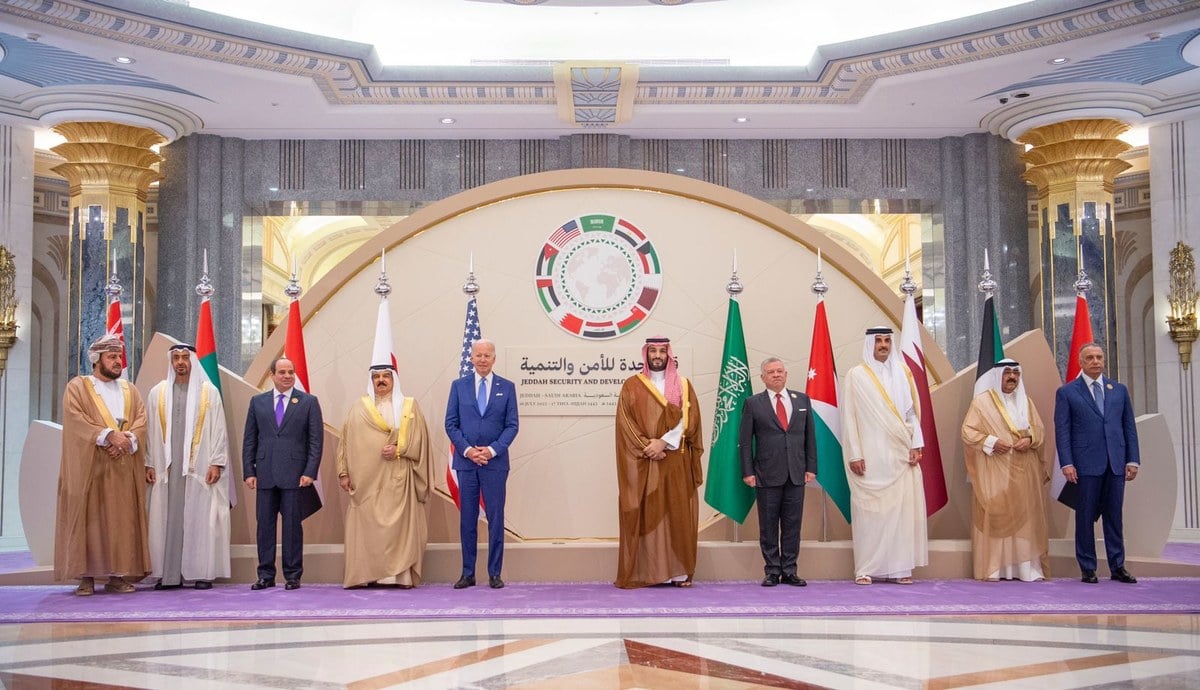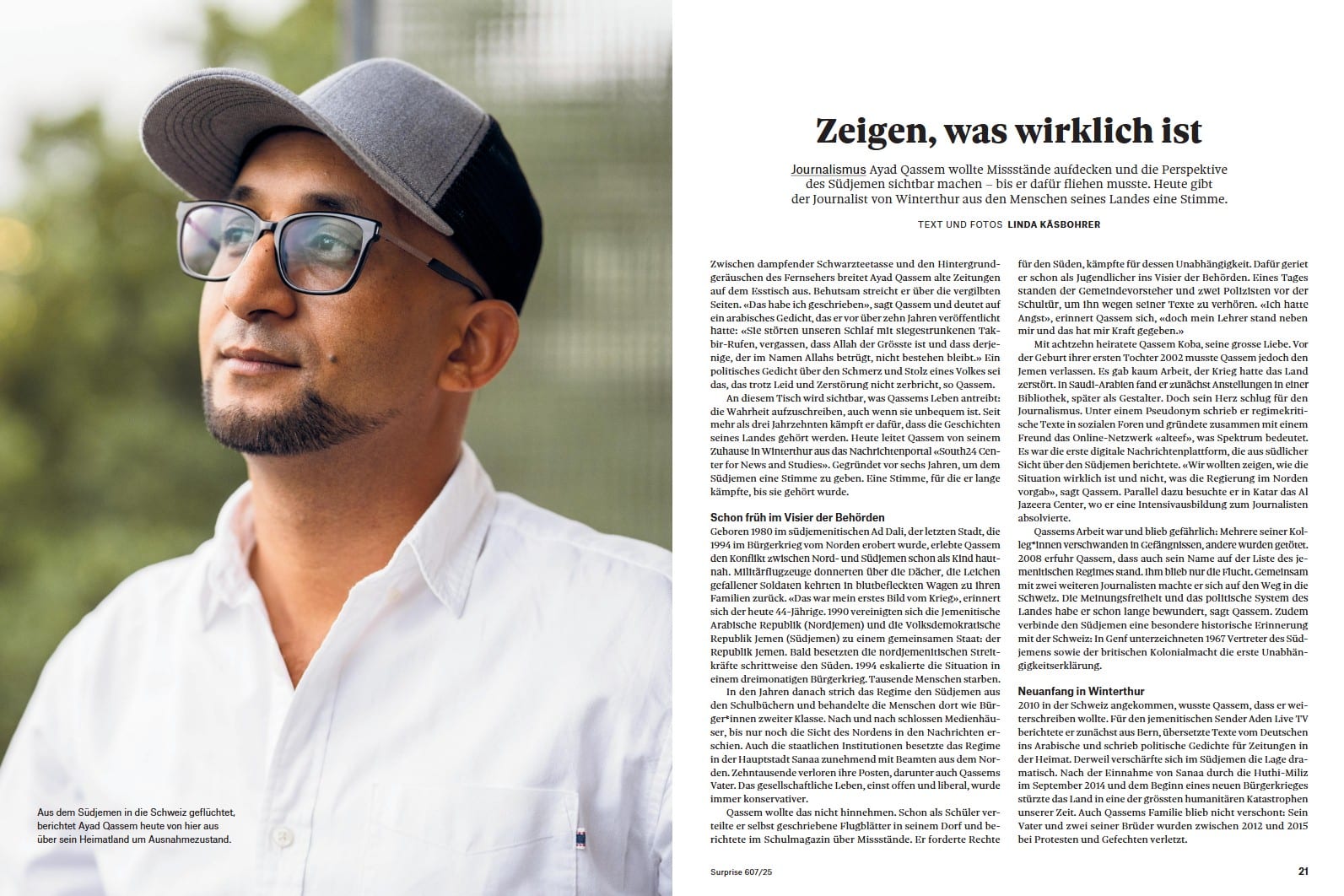
Leaders of the participating countries in the Jeddah Summit (SPA)
آخر تحديث في: 17-07-2022 الساعة 7 مساءً بتوقيت عدن
Jeddah (South24)
Yesterday, the Arab-American Security and Development Summit was held in Jeddah, Saudi Arabia, with the participation of the United States, Saudi Arabia and the Gulf states, Egypt, Jordan and Iraq, and in the absence of Yemen.
At the summit, which was preceded by several bilateral meetings between state leaders, the leaders affirmed unified positions on many files and issues, foremost of which are the Iranian nuclear program, the war against "terrorism", and the security of international waterways.
The leaders' speeches also included an emphasis on consolidating joint Arab-American relations and strategic security cooperation to enhance security and stability in the region. The summit discussed the interests of the participating countries.
Strong return for Washington
“We will not walk away and leave a vacuum to be filled by China, Russia or Iran,” said US President Joe Biden in his speech to Arab leaders in Jeddah. The Democratic president, whose reception in Jeddah was described as "muted", spoke of a "vision and strategy for America's engagement in the Middle East."
He also announced "a new era of cooperation in the region that includes new members, including Israel," affirmed "Washington's commitment to support allies in defending their security."
Saudi Crown Prince Mohammed bin Salman and other Arab leaders expressed the hope that "the Jeddah summit will establish a new era of Arab and American cooperation."
Iran
Neighboring Iran occupied a remarkable and expected space of attention and focus at the Jeddah summit, especially from the American and Saudi sides. The final statement of the summit called on Tehran to "fully cooperate to keep the Arab Gulf region free from weapons of mass destruction."
Read more: Jeddah Security and Development Summit: Final Statement Issued
Biden said that he is committed to ensuring that Iran never gets a nuclear weapon and accusing Tehran of "destabilizing the region," and declaring that Washington will "integrating air defenses and early warning systems to ensure that we can defeat airborne threats."
Saudi Crown Prince Mohammed bin Salman called on Iran to "cooperate with the countries of the region and not intervene in the affairs of regional countries." The Crown Prince called on Tehran to cooperate with the International Atomic Energy Agency over its nuclear program.
The speeches of both the Crown Prince of Kuwait and the King of Bahrain also included similar claims to Iran regarding its nuclear program.
The Iraqi Prime Minister, Mustafa Al-Kadhimi, said that "Iraq supports the path of dialogue and negotiations to remove nuclear weapons from the region." The Emir of Qatar affirmed his country's "firm" position to spare the region from the "dangers of nuclear armament."
Biden welcomed Iraq's role in bringing the Saudis and Iranians together at the negotiating table in Baghdad.
Yemen
Unlike all countries in the region, Yemen, in which the war has entered its eighth year, was absent from the summit, despite the presence of the Chairman of the Presidential Leadership Council Rashad Al-Alimi in the city of Jeddah.
The official Saba news agency had announced a single meeting between Al-Alimi and the US Secretary of State to discuss the truce extension in Yemen and the war against terrorism.
In the final statement of the summit, the Yemeni crisis was not present as expected, as the statement only welcomed the truce and the formation of the Presidential Leadership Council in the country. The statement expressed the hope of the leaders of the participating countries to reach a political settlement in Yemen "according to the three references."
In their speeches, the summit leaders were satisfied with emphasizing the importance of the truce in the country and supporting efforts for a political solution.
Biden said that, thanks to the truce, Yemen "is experiencing a period of peace for the first time in seven years," stressing that Washington "will work with Riyadh and Muscat to find a political solution in Yemen." And announced the Saudi's approval to extend the truce.
Mohammed bin Salman did not miss the renewal of Riyadh's position in support of "all efforts aimed at a political solution in Yemen."
Maritime safety
The US President warned against endangering the security of international navigation in the region. Freedom of navigation in the Red Sea is a priority for the US administration, he said.
The King of Bahrain called for activating the work of the joint naval forces to protect international navigation in the Straits of Hormuz and Bab al-Mandab.
A joint US-Saudi statement, prior to the summit, had "welcomed the newly-established Combined Task Force 153 with a focus on the Red Sea’s Bab al-Mandab Strait in the Red Sea." The statement also welcomed Riyadh's assumption of command of this force.
Counter-terrorism
Countering regional terrorism was a top file in the agendas of the Jeddah summit. The US President said that Washington is determined to eliminate the sources of terrorism in the Middle East.
Biden stressed that the United States will "continue its work in counter-terrorism in cooperation with the countries of the region." Egyptian President Abdel Fattah al-Sissi said that "the dangers of the spread of terrorism have become more threatening with the worsening global and regional crises."
Al-Sisi called on "supporters of militias and mercenaries to reconsider their accounts." He said, "there is no complacency in protecting our national security and the associated red lines."
The Iraqi prime minister also stressed the need to "develop a comprehensive strategy to combat terrorism in the region."
The Palestinian issue
Generally, the participating leaders agreed that the two-state solution is the most appropriate solution to the Palestinian-Israeli conflict. The final statement of the summit stressed "the need to reach a just solution to the Palestinian-Israeli conflict on the basis of the two-state solution."
The Egyptian president said that “an independent Palestinian state must be established on the 1967 borders.” The Jordanian king also stressed the need for “a just solution to the Palestinian issue" and an end to Israeli violations.
The Qatari emir called on Israel to "stop its practices in building colonial settlements, changing the character of Jerusalem."
Mutual interests
Basically, the mutual interests of the leaders participating in the Jeddah Summit were the real focus of the summit.
The United States has announced its strong presence again in the region, after the cooling of relations with the countries of the region and the increasing American interest in other regions of the world such as East Asia, where China is.
Washington also obtained an increase in Saudi oil production, as Prince Mohammed bin Salman announced, in his speech, that his country would increase the capacity of its oil production to 13 million barrels per day.
On the other hand, Saudi Arabia has once again reinforced its assumed position as the leader of the Gulf and Arab region and as a major player in the Middle East, and perhaps the world.
Riyadh also obtained more assurances and American commitments to ensure its security and the security of neighboring Abu Dhabi. In recent times, Saudi Arabia and the UAE have been subjected to unprecedented attacks by the Iran-backed Houthis in Yemen.
As for Iraq, Prime Minister Al-Kadhimi returned to his country with an agreement for the electrical interconnection plan between the electricity networks of the Gulf states and southern Iraq, in addition to more security support to ensure that ISIS does not return.
Egypt also obtained a strong, united position that supports it in its dispute over the Nile dam with Ethiopia. The final statement of the Jeddah Summit affirmed support for "Egypt's water security." During the summit, President al-Sisi called for "re-drafting laws that maintain water security."
The US President and the King of Jordan signed an aid memorandum of $1.45 billion for the latter's state.
As for the Sultanate of Oman, whose sultan merely sent his own representative, the gains are not clear, but Muscat has reaffirmed its Gulf and Arab presence and the good relationship with its neighbors. The Sultanate also received tacit acknowledgment from Biden for its influence on Yemen.
Qatar participated in the summit after years of estrangement with Saudi Arabia and other Gulf countries after the recent improvement of relations between it and Riyadh and Abu Dhabi.
South24 Center
Sources: (SPA, media of participating countries)

قبل 3 أشهر

قبل 3 أشهر